We may earn a commission from links on our site, but this doesn’t affect our reviews. Learn more.
Hedge With Crypto is an independent publisher that provides objective and free content. Articles on our site may include links to our partners. If you click on these links, we may earn a commission. However, our editorial content remains unbiased, reflecting our own opinions or the general information available. For more information on our company policies, read the Affiliate Disclosure, Privacy Policy, and Terms & Conditions.
How To Buy Crypto ETFs In Australia
This information is general in nature and is for educational purposes only. Hedge With Crypto does not provide financial advice nor does it take into account your personal financial situation. We encourage you to seek financial advice from an independent financial advisor where appropriate and make your own inquiries.
TABLE OF CONTENTS
There are now multiple blockchain-centric funds that Aussies can buy from traditional stockbrokers. This guide will explore the various types of Bitcoin and crypto ETFs Australians can buy the pros and cons of these funds, and a step-by-step guide on how to buy crypto ETFs in Australia.
Here's a quick guide on how to buy crypto ETFs in Australia:
- Choose a crypto brokerage platform.
- Register an account.
- Deposit funds.
- Select a crypto ETF to buy.
- Buy the ETF.
Featured Partner

Kraken
Best Exchange To Buy Bitcoin
4.8 out of 5.0
Kraken is a top-rated and regulated exchange best known for its safety and multiple methods to buy Bitcoin and crypto worldwide.
222
USD, GBP, EUR, CAD, CHF, JPY & AUD
Bank transfer, SWIFT, SEPA, debit and credit card
0.16% (maker) and 0.26% (taker)
What Are Crypto ETFs?
To understand crypto ETFs, we must first dig into what ETFs actually are. Exchange-traded funds (ETFs) are extremely popular investment vehicles that can be purchased from nearly every major brokerage worldwide. Unlike buying a stake in a business directly, ETFs track the value of an underlying asset. This often takes the form of an index, where the ETF represents the market cap of a “basket” (multiple) stocks rather than just one. For example, the ASX200 ETF represents an aggregate valuation of Australia’s top 200 companies. In other cases, an ETF can track the value of a single commodity, like gold or Bitcoin, to help investors avoid difficulties in storing these assets.
Crypto ETFs tend to track the price of an underlying coin (usually Bitcoin or ETH) or a group of companies innovating within the blockchain space. These can be traded on regular stock exchanges but not on crypto trading platforms or DeFi apps like actual cryptocurrency.
How To Buy Cryptocurrency ETFs Australia
Step 1: Choose a crypto EFT broker
The first step is to compare and select a brokerage firm within Australia that offers cryptocurrency ETFs. This tutorial will walk you through investing in a crypto ETF using SelfWealth. However, several alternative Australian brokers may better suit your specific financial goals. It is vital to research each platform thoroughly before deciding which to use when buying crypto ETFs.
What's the difference? Brokers vs crypto exchanges: which should you use?
Step 2: Register an account
Registering an account with a stock broker can be a bit complex and time-consuming. New customers will need access to identity documents and basic residential and financial information. In that sense, it is quite similar to opening an account on a cryptocurrency exchange like CoinSpot or Binance.
To get started, head over to SelfWealth’s website and select “Create a new account”. Input an email address, password, then verify the email provided to unlock the account.
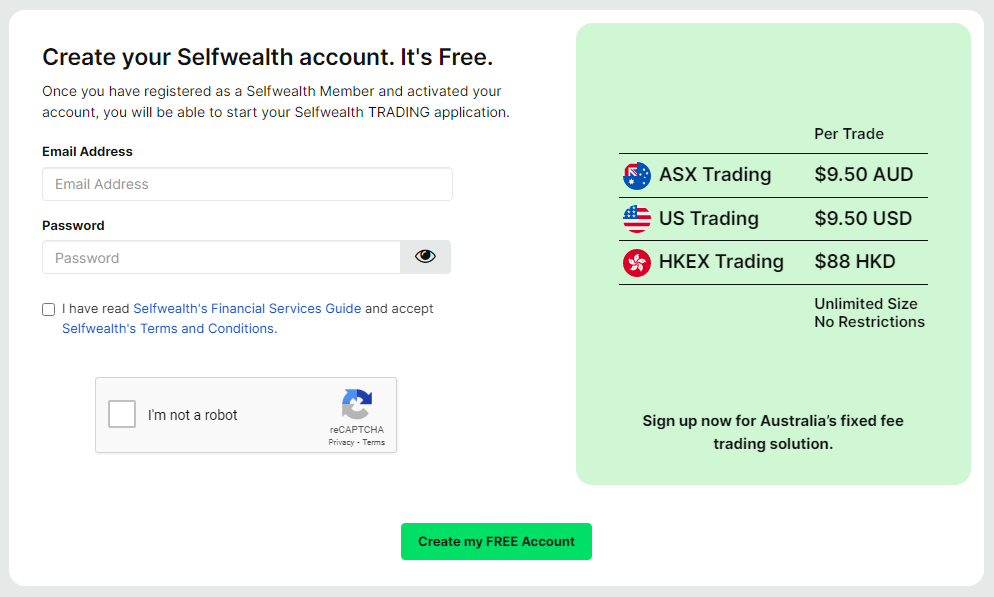
Before customers can start trading on the newly minted account, they must pass an application. The exact process will vary from broker to broker but should be relatively similar. On SelfWealth, new accounts need to provide:
- Personal details (such as an address, mobile number, etc.)
- Those with pre-existing share portfolios will need to input their unique Holder Identification Number (HIN)
- Bank account details (for withdrawals)
- Identity document
Once the application is complete, the account may take a little while to be verified. Once the process is finalized, new customers will receive an email confirming they can begin trading.
Step 3: Deposit funds
Certain stockbrokers will accept instant deposit methods such as debit/credit card payments. However, in most cases, funding a share trading account is a little more convoluted than when using a crypto exchange. Customers will typically have to transfer AUD to their stockbroker’s bank account and wait for 24-48 hours for the transaction to clear.
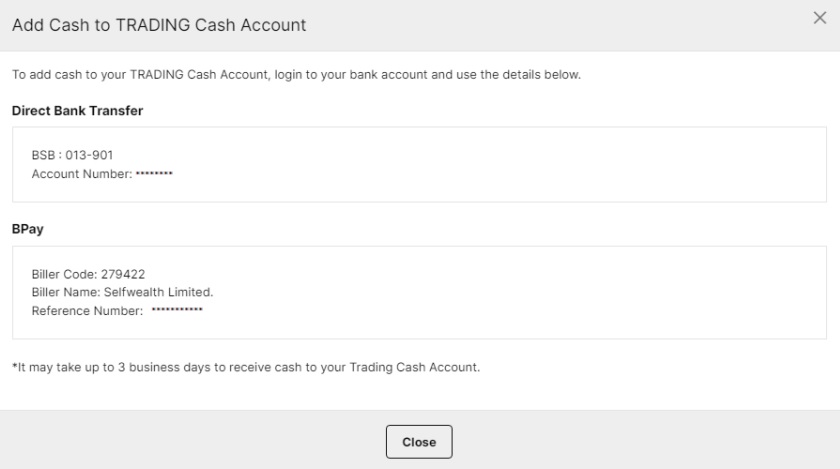
To deposit AUD on SelfWealth for the first time, investors must navigate to the “Deposit Cash” tab on the left-hand pane of the website. From here, a box will pop up containing the trading account’s bank details, including a BSB and Account Number. Customers are also provided with BPAY details if they prefer to use that transfer method.
Send the AUD to be invested to the trading account’s bank details, as you would send funds to any other bank account. For most investment platforms (like SelfWealth), first-time investments into a stock holding must be at least $500, so be sure to transfer enough money.
Step 4: Choose a crypto ETF to buy
If investors have already decided which crypto ETF they wish to buy, its investment page can be easily found by typing in its name or ticker into the platform’s search bar.
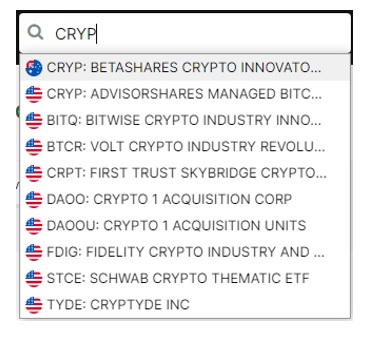
For those yet to decide, browsing the broker can be a great way to learn more about potential investment opportunities. For example, SelfWealth provides information regarding market depth, trading volume, recent performance, and any relevant news.
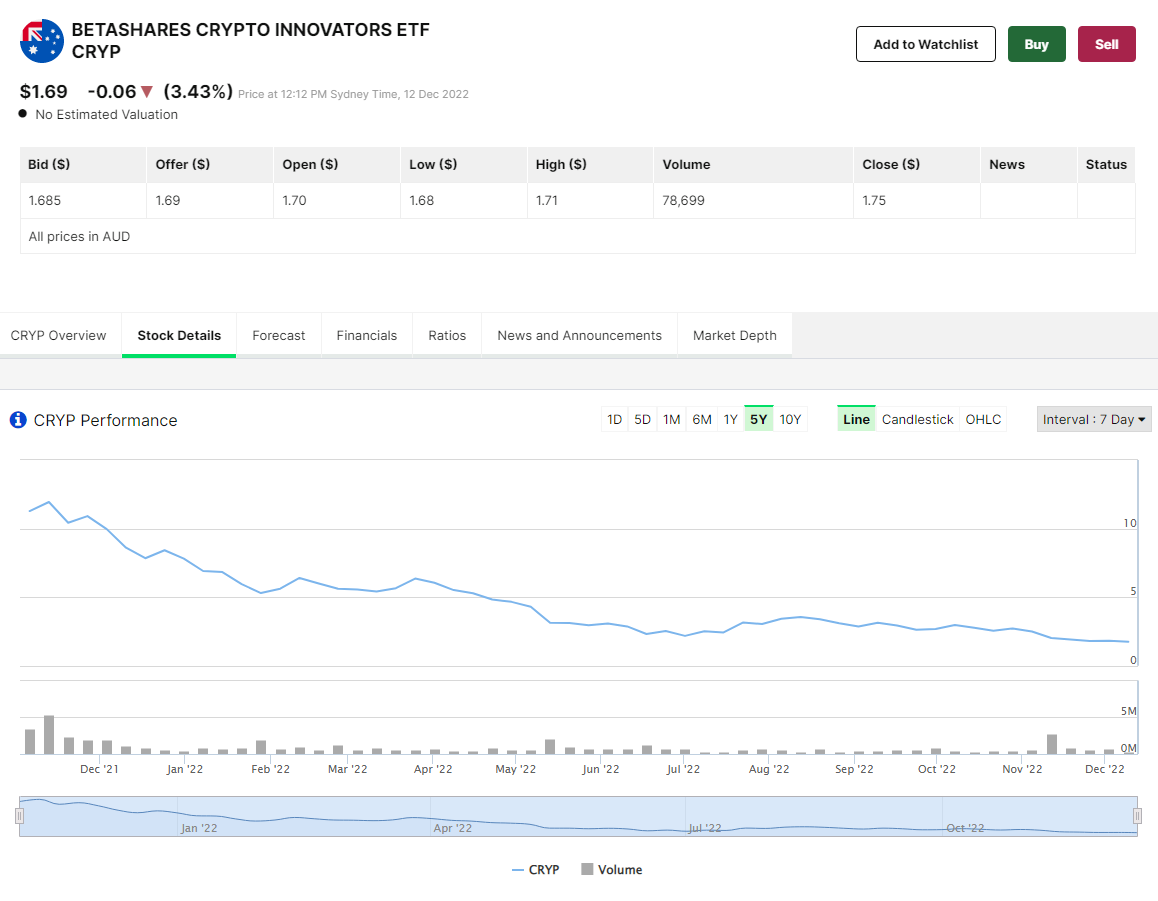
Step 5: Buy the Crypto ETF
Once the bank transfer has been processed and the funds have hit the trading account, it’s time to invest in the desired crypto ETF. There are a few ways to do this on SelfWealth, but the easiest is to head over to the ETF’s page (like in Step 3) and click the green “Buy” button.
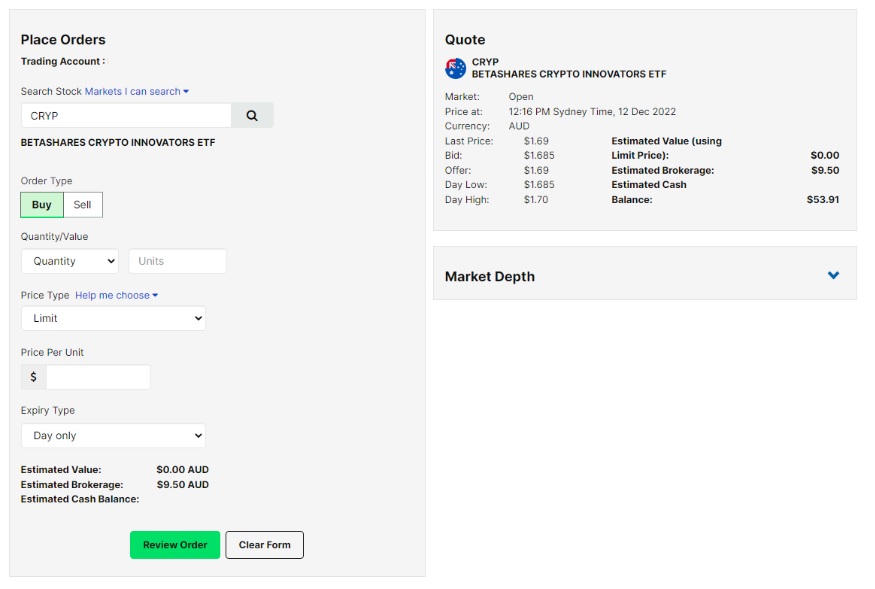
This will bring up the order screen, where investors can decide how much of the ETF they wish to buy, the order type, and the expiry type. Novice investors will likely stick to “market” orders, whereas more experienced traders might want to use limit orders to optimize their average purchase price.
Once the order form has been filled, simply select “Review Order” and confirm the submitted details are correct. That’s all there is to it – market orders will usually be filled almost immediately and added to the platform’s portfolio. Limit orders may take a while to execute but investors will receive an email when the order has been fulfilled.
The Best Way To Buy Cryptocurrency ETFs
There are several different ways to buy crypto ETFs, but the most common (and easiest) is through an online stock broker. Australia is home to 50+ platforms that support buying, selling, and trading ETFs on the ASX and international markets.
Most stockbrokers in Australia are fundamentally similar – offering the convenient purchase and storage of investments that can be accessed via a website or mobile application. Some specialize in micro-investments (purchases under $100) such as Bamboo, while others are linked directly to bank accounts (CBA/Westpac Share Trading).
Where To Buy Crypto ETFs Australia
Given the wealth of options to own crypto in Australia, choosing a platform to buy crypto ETFs can be difficult. The first thing to ensure is that the broker sells the desired assets. Other factors to consider include brokerage fees, services like copy trading or customizable charting, and minimum investments.
Some of Australia’s most popular stock brokers that offer crypto ETFs include:
- SelfWealth
- CommSec
- Westpac Online Investing
- CMC Markets
- Robinhood
- Stake
The Types of Crypto ETFs Can Be Bought In Australia
There are three main types of crypto ETFs for potential investors to consider.
1. Spot ETFs
Spot ETFs are the simplest form of ETF accessible to Australians. These funds usually just track the price of their underlying asset, plus a premium. For example, a spot Bitcoin ETF would generally follow the price movements of BTC, with a 5-10% premium attached for convenience.
Spot ETFs in the crypto sector usually only track the price of one underlying asset, rather than multiple. However, as the intersection between traditional and decentralized finance evolves, likely, spot ETFs reflecting an index of the top five (or more) cryptocurrencies will pop up.
This type of fund is nearly always backed by a physical reserve – so, at the time of writing, $1,500 invested into a spot Bitcoin ETF would be similar to buying 0.1 BTC. In that sense, investors are essentially paying an intermediary to store their digital currencies in a cold wallet on their behalf. This is almost identical to storing crypto on a cryptocurrency exchange (such as Swyftx and CoinSpot). However, investing in an ETF comes without some of the risks, as there are much stricter regulations and laws for fund managers to abide by.
2. Futures ETFs
Futures ETFs are a slightly different form of exchange-traded fund that isn’t backed by underlying assets. Rather, they are managed by a company that is actively exchanging various futures contracts. Although their methods are fundamentally different, futures ETFs will essentially try to mimic the actual price of an asset – much like spot ETFs. For example, an investor who purchased a Bitcoin futures ETF would actually be investing in derivative contracts based on BTC’s price action.
3. Blockchain Company ETFs
The final option for Australian investors interested in ETFs is indices that track industry innovators. Also known as “pick and shovel” investing, these funds provide exposure to a range of companies in the blockchain industry rather than the price of an actual coin. The ETF might instead comprise mining corporations, fintech startups, or blockchain-as-a-service businesses.
Interest in these businesses usually ebbs and flows similarly to the overall digital currency market, so large downturns (or rises) will likely be mirrored in the price action of these ETFs. That said, blockchain companies and individual cryptocurrencies aren’t always correlated, making these ETFs a solid way for bullish investors to diversify their portfolios.
Best Crypto ETFs In Australia
There are only a select few cryptocurrency ETFs available to Australians. The limitations investors will encounter are caused by several different factors. First, acquiring approval and meeting all the regulatory requirements for publicizing and managing a stock market fund is difficult and time-consuming. The rather harsh crypto winter of 2022 has also wreaked havoc, causing several ETFs to be sold and delisted from Australian stock brokerages as investor interest has cooled off. With that in mind, a couple of viable options remain available to Oceanian residents.
1. BetaShares Crypto Innovators ETF (Ticker: CRYP)
BetaShares is one of Australia’s most popular fund managers, providing ETFs in a wide range of financial and geographical sectors. Their first entry into the crypto industry, CRYP, was released on November 4, 2021. This particular fund tracks various innovators within the blockchain industry, focusing on companies that are building mining equipment and providing key services to the industry.
Companies tracked in the ETF include:
- MicroStrategy INC
- Coinbase
- Riot Blockchain
- NVIDIA
2. 21Shares Bitcoin and Ethereum ETFs (Ticker: EBTC/EETH)
The 21Shares Bitcoin and Ethereum ETFs are spot funds that track the underlying price of the respective cryptocurrencies. Released in May 2022, they were one of the first publicly traded stocks to provide Australians direct exposure to the price action of BTC and ETH. Each share in these ETFs represents a fraction of the price of its corresponding coin. For example, if Ethereum was trading at $1,800, one EETH share would be worth around $1.80.
3. 3iQ CoinShares Bitcoin/Ethereum Feeder ETFs (Ticker: BT3Q/ET3Q)
3iQ CoinShares’ spot price ETFs were released to Australians in the middle of 2022. They are called “feeder funds” as they provide exposure to assets originally listed on the Toronto Stock Exchange. 3iQ has invested in long-term holdings of BTC and ETH, although the pricing structure of this security isn’t as direct as other spot ETFs. Generally, the BT3Q and ET3Q ETFs struggle with volume and liquidity, which can make them a little harder to buy and sell at market price.
Can You Buy International Crypto ETFs In Australia?
Australians may not be satisfied with the number of crypto-based ETFs available on local stock exchanges. Luckily, many international substitutes are accessible online. To trade international securities, investors must source brokerages that offer this specific service. Trading ETFs from overseas markets can be a little more expensive, as using AUD tends to incur foreign exchange fees.
Potential international crypto ETFs include:
- ProShares Bitcoin Strategy ETF
- Grayscale Bitcoin Trust
- Global X Blockchain ETF
- VanEck Bitcoin Strategy ETF
Update 21/6/2024: VanECK has released a Bitcoin ETF in Australia.
Why Invest In Crypto ETFs Instead of Digital Currencies?
An investor may consider buying a crypto ETF from the stock market rather than holding the coins themselves for several reasons.
Tighter regulations and lower risk of hacks
Most ETFs are purchased and managed by the ASX (or CBOE), which is a highly regulated and reputable marketplace. There are many protections in place for investors in the Australian stock market, much like when storing funds in a bank account. Liquidation risks, as the industry saw with FTX, are extremely unlikely to occur when investing in ETFs. This is because stock ownership in Australia is a bit like storing crypto in a non-custodial wallet – investors usually own their assets directly.
A broker going bust would be inconvenient but have a minimal financial impact on the crypto ETF holder. In addition, owning digital currencies through an ETF proxy ensures that the risk of hack is almost zero, as no coins are actually held on the brokerage platform.
Convenience
Learning how to navigate a crypto exchange has become increasingly streamlined over the past few years, but it can still be a bridge too far for the uninitiated. Many investors will feel more comfortable using a stockbroker (online or physically) to gain crypto exposure.
On top of this, the contagion of 2022 caused many to become wary about storing their coins on centralized platforms. However, the alternative – using non-custodial wallets – can be very intimidating for newcomers. If one were to misplace their private keys and wallet seed phrase, there may be a little course of action for reclaiming the lost cryptocurrency. By investing in a spot ETF that tracks the price of Bitcoin or Ethereum, investors are essentially paying a premium for someone else to worry about the best way to store BTC/ETH.
Diversification
Many investors are bullish on the future of blockchain technology while being skeptical about actually buying digital coins. Crypto ETFs provide a middle-ground where traders can diversify into the industry without navigating crypto markets or holding specific coins. For example, the BetaShares Crypto Innovators ETF is weighted toward tech companies doing cool things with blockchain rather than crypto-only businesses (such as GPU producers NVIDIA). Therefore, the asset will grant some exposure to the ups and downs of the crypto market while avoiding the wild overnight swings it’s associated with.
Pros and Cons of Buying Crypto ETFs In Australia
Pros:
- Tightly regulated markets with consumer protection
- Investors can buy into a “basket” of assets, mitigating risk and exposure to the performance of just one coin/company
- Less counterparty risk than using centralized crypto exchanges
- No need to mess around with wallets, seed phrases or private keys – crypto ETFs provide exposure to the big cryptocurrencies without the hassle
- Can be an easy way to diversify a portfolio into the blockchain tech sector without buying and storing coins
Cons:
- Very limited options available, particularly on the Australian Stock Exchange (ASX)
- Investors pay a premium on the price of BTC/ETH compared to buying coins outright
- Stock brokers typically charge higher brokerage fees than crypto exchanges
- The minimum investment for most first-time ETF purchases is AUD$500, compared to less than $1 on most crypto markets
- Investors must purchase full units of stocks, rather than being able to buy fractional amounts of a cryptocurrency
- The same risks of volatility apply to any crypto ETFs tracking the spot price of BTC/ETH
The History of Crypto ETFs In Australia
For some time, acquiring ETFs from the cryptocurrency/blockchain industry was impossible. The Australian Securities and Investment Commission (ASIC) and other regulatory bodies consistently denied applications from fund managers throughout the late 2010s. However, European and American stock exchanges began to change tact in 2021, with the Securities and Exchange Commission (SEC) approving the United State’s first-ever Bitcoin ETF, BITO.
The event caused a wave of new approvals across the globe, with Australia eventually joining the fray. In May 2021, ETF Securities, in conjunction with 21Shares, released the nation’s first ETFs following the price of a specific crypto, EBTC and EETH.
Frequently Asked Questions
Is There A Crypto ETF In Australia?
Yes, investing in crypto and ETFs is legal in Australia. There are several crypto ETFs that can be purchased using local or international stock brokers. Examples include securities that track the price of an underlying cryptocurrency or funds that comprise various companies working in the blockchain sector.
Is There A Crypto Coin ETF?
Yes, there are quite a few exchange-traded funds that follow the price of an underlying coin – usually Bitcoin (BTC) or Ethereum (ETH). Such securities are usually backed by a physical reserve, meaning the company issuing the ETF holds a proportionate amount of an asset in a hardware wallet.
Can You Buy A Crypto Index Fund In Australia?
Yes, there are several crypto index funds available across international share markets. While there are no Australia-based options, investors can consider assets like the Nasdaq Crypto Index (NCI) which provides exposure to eleven of the biggest market-cap digital currencies.
Does Vanguard Have A Crypto ETF In Australia?
No, as of December 2022, Vanguard does not offer a crypto-based ETF or any other digital currency-related asset. However, the management team is always reviewing their offerings and there is potential for a Vanguard-managed crypto ETF in the future.
